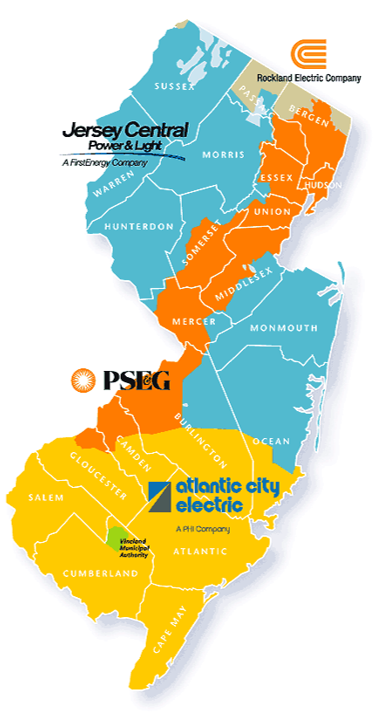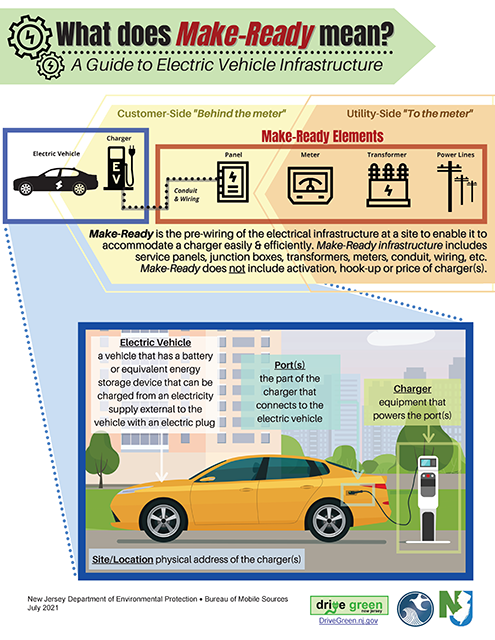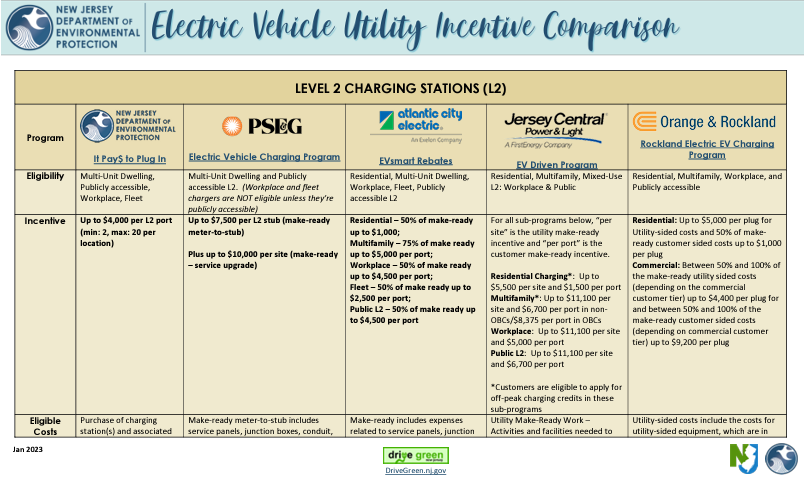
It Pay$ to Plug In
It Pay$ to Plug In provides grants to offset the cost of purchasing and maintaining electric vehicle charging stations. The program is designed to expand New Jersey’s growing network of electric vehicle infrastructure, allowing residents, businesses, and government agencies to purchase and drive electric vehicles. EVs dramatically reduce vehicle emissions and improve air quality for everyone.
How to apply for a project:
Step 1: Read the Overview and Instructions and visit the System for Administering Grants Electronically (SAGE) to complete your application.
Visit the SAGE Instructions for detailed instructions on how to submit your application via the SAGE portal.
Visit the It Pays to Plug In FAQ for answers to the most frequently asked questions.
Step 2: Obtain three (3) quotes for the EV charging stations. View the requirements for quotes.
Step 3: Submit all required documents via the SAGE portal.
Step 4: If the grant application is approved, NJDEP will provide and execute a grant agreement with the applicant via the SAGE portal. (Note: Application Decision/Approval is not grant execution.)
Step 5: Install Level 1 and Level 2 charging station(s) within 9 months of NJDEP grant execution. Do not purchase or install equipment before your grant has been executed. Completed projects are not eligible.
Step 6: Complete and submit the Expenditure Report and the Charger Information Form via SAGE along with paid itemized invoices, proof of payment, and photos.
Step 7: After NJDEP review and approval of provided invoices, grant funds will be disbursed.
*New applications are added to our waitlist. We approve applications on a first-come, first-served basis. Please be aware that programmatic changes may be made during the application or grant process. Applicants may be contacted for updates.
Eligible Applicants
Private residential dwellings other than multi-unit dwellings are not eligible for grants.
The program is open to all other applicants: Businesses, governments, non-profit organizations, and educational institutions.
Eligible Projects
Workplaces: Level 1 and Level 2 charging stations for employees who drive electric vehicles. Examples include workplace chargers for employees who drive electric vehicles to work, and chargers for fleet vehicles.
Public Places: Level 1 and Level 2 charging stations that are open to the public. Examples include charging stations in downtown areas, public parking lots and garages, hotels, transit centers, leisure destinations, colleges and universities, retail parking areas, and public parks.
Multi-Unit Dwellings: Level 1 and Level 2 charging stations for multi-family residences, including apartments, condominiums and townhouses. There must be a minimum of five (5) units. DEP and BPU MUD Grant Program Comparison
Corridor: DC Fast Charging stations that are open to the public, provide 150kW or greater power, and are on the priority corridors identified in the strategic mapping will be prioritized for funding. Learn more
Community: DC Fast Charging stations that are open to the public, provide 50kW or greater power, and are in locations where people live and work. Learn more
eMobility: Electrification projects for shared mobility projects like car sharing and ride hailing services. Visit the eMobility page to learn about qualifying projects and active solicitations.
Eligible Chargers
Pursuant to N.J.S.A. 52:27D-141.18 et seq. “New Jersey Appliance and Equipment Efficiency Standards,” any Level 1 and Level 2 EVSE product with a date of manufacture after January 18, 2023, and sold or installed for compensation in New Jersey, must meet or exceed the “Energy Star Program Requirements Product Specification for Electric Vehicle Supply Equipment, Version 1.0” developed by the United States Environmental Protection Agency (Energy Star Version 1.0). (DCFC EVSE products are not covered by Energy Star Version 1.0 and thus are not subject to N.J.S.A. 52:27D-141.18 et seq.) Therefore, any Level 1 and/or Level 2 EVSE product included in a grant application must meet or exceed the Energy Star Version 1.0 specifications to be eligible to receive state grants. If a grant application includes documentation that a Level 1 or Level 2 EVSE product is in the process of obtaining the appropriate Energy Star certification and label, that application will be eligible for [grant / rebate] award, with final payment contingent on the product having obtained the applicable certification and label.
Stakeholders are encouraged to visit https://njdepwptest.net/appliancestandards/ for more information about the relevant New Jersey requirements, and ENERGY STAR Certified Electric Vehicle Chargers | EPA ENERGY STAR or State Appliance Standards Database for product listings.
See the IPPI Overview and Instructions for more charger requirements.
Reimbursement Amounts
Upon completion of work in accordance with the eligibility criteria, NJDEP will reimburse each applicant for a percentage of eligible costs, up to a maximum of:
$750 per Level 1 charging port;
$4,000 per Level 2 charging port.
eMobility reimbursements will vary depending on location and availability to the public.
If the Applicant is participating in It Pay$ to Plug In and a utility EV charging infrastructure incentive program simultaneously, the Applicant must notify NJDEP and the appropriate utility program of dual-participation.
Ask your electric utility about incentives for chargers.
Atlantic City Electric EVsmart Program
Jersey Central Power & Light EV Driven Program
PSE&G Electric Vehicle Charging Program
Rockland Electric EV Charging Program
Charging Station Projects / Disbursement Reports
It Pay$ to Plug In has provided grant funding to a myriad of charging station projects throughout New Jersey. These reports present how many locations have installed charging stations, and how many of those stations are available for public use. The program’s current funding levels are presented as well.


